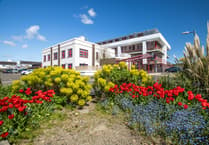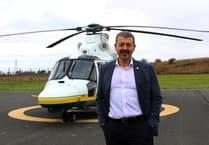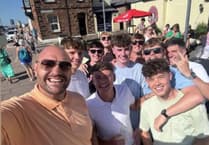Kathleen Oates - a Wren assigned to the Women's Royal Naval Service during the Second World War - was transferred to the Isle of Man in 1944, where she would stay for almost 18 months. During her time on the island, she wrote dozens of letters to home which provide a unique commentary on the operations at Ronaldsway and what life was like on the Isle of Man 80 years ago. Her daughter, CHRISTINE SMITH, pores through her mother’s letters as part of a series of columns based on Kathleen Oates’s writing...
From Autumn 1945 onwards, Wren Kathleen Oates’ descriptions of life at Ronaldsway began to change. It was already clear that the pace of work for those not yet demobbed from the Services had lessened on the Isle of Man and elsewhere. However, Kathleen suddenly reported many more extra-curricular activities at the Base.
At the end of September, she had casually mentioned a new possible evening entertainment: with friends, she had tried ‘a new meeting on Camp – ‘Christian Fellowship’ started by our new Padre. We’d nothing else to do so we drifted there and quite enjoyed a discussion. It was a change for one’s mind to work in other than the usual “service channels”’.
Not only had she continued to attend these meetings, but her letter of October 18 described many others. ‘Now for my week’s activities. Tuesday night I went to the Music Circle and enjoyed it very much. A Third Officer presents it from records on a Radiogram [a combined radio and record player in a cabinet with a speaker]. The main work which we listened to was Gustav Holst’s Planets Suite. There were about six records, each describing a different planet – it was extremely easy to listen to - “picture” music. We had a free coffee and cakes in the interval - out of some mess fund, I suppose. They were very nice cakes, from the YMCA. It’s rather nice having refreshments at these meetings – we have coffee and cakes at the Christian Fellowship too.’
And this was by no means all. Educational and Vocational Training (EVT) classes had been started by the RAF to provide training for personnel which aimed at helping them adapt to civilian life once they left the Service, and this was now being expanded into other Forces such as Ronaldsway’s Fleet Air Arm – and welcomed by Kathleen. ‘On Wednesday morning from 8:45 till 10am, I went to my first EVT class – French. We are taking it from matriculation standards [i.e. at least GCSE level] onwards. A Petty Officer Wren is taking it. I think I shall go to the beginners’ class also and do a little revision. Tonight, it’s Christian Fellowship, but there’s also a lecture on art appreciation, so I think I shall be tempted to go to the latter. There’s also a PT class at 5:30pm, which I Intend to go to – so I shall be quite busy. French in the morning again at 8:45!’
.jpg?trim=0,0,200,0&width=752&height=501&crop=752:501)
Kathleen’s second letter that week, written on October 19, was complimentary about the standard of teaching. ‘The art lecture last night was excellent – really enjoyable and most instructive. I’m looking forward to the next three. He talked about the essentials of making any picture: line, shape, tone, colour et cetera. He illustrated his talk with epidiascope [an electric projector capable of displaying both transparent slides and opaque images onto a screen], showing pictures of the Old Masters and Surrealists etc.’
EVT classes also covered subjects like mathematics, English, typing, book-keeping, decorating and citizenship. At this stage, Kathleen did not mention the additional EVT classes given to the WAAF (Women's Auxiliary Air Force), such as housecraft, dressmaking and embroidery, to prepare women for their presumed return to a home environment. Kathleen had attended sewing classes earlier in the year at Ronaldsway; it is not clear whether they were part of the EVT scheme.
Naturally, work at the Base continued – weather permitting. ‘Weather influences our lives so much here – the first thing I asked this morning while half asleep, was “What’s the weather like? Can you see the hills?” If we can see the hills, it’s usually OK for flying. Today it’s restricted flying – no bombing.’
During a spare moment in the Control Tower, Kathleen continued her letter: ‘we’ve just picked up a distress signal from a stray aircraft somewhere out Port Erin way. Air/sea rescue are standing by, but so far, we can’t get any definite bearings on the radar plot, so we don’t know exactly where he is. It isn’t one of our aircraft.’.
She continued later, when her shift was over: ‘back again in camp as afternoon flying has been cancelled. We didn’t hear any more of that aircraft in distress – though it caused quite a flap. The general opinion is that he pressed the wrong button and wasn’t in distress at all.’ There was definite relief at the false alarm after so many previous “prangs” experienced at Ronaldsway.
Kathleen continued to appreciate being a Wren, to the extent that she toyed with the idea of remaining a while longer in the Services. ‘I was talking to one girl in the Mess at lunchtime, who is signed on to the end of the Present Emergency - you’ve no idea how tempted I am. However, remembering my approaching birthday and the fact that I have to earn my own living, I will suppress temptation. All the same, I don’t think the present time is a very good one for returning to Civvy Street.’ “The Present Emergency” covered addressing the consequences of the War on both a defeated Germany and the countries attacked and occupied by the Nazis.
For the moment, then, Kathleen focused on her upcoming twenty third birthday. ‘On Sunday [October 21], I’m hoping for good weather, because I intend cycling or walking to Port Saint Mary and treating several of the gang to tea there at our favourite Wendy’s’. The reality of Civvy Street was deferred for the moment.



.JPG?width=209&height=140&crop=209:145,smart&quality=75)
